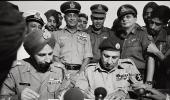Kissinger's approach of balance of power, secret diplomacy and moderating ideology are the need of the hour.
That is the greatest tribute to an intellectual who had a major impact on the world in his lifetime, notes Colonel Anil A Athale.

Dr Henry Kissinger passed on at the age of 100 on November 29, 2023.
Reviled by many in India for his anti-India stance in 1971 and his racist comments against Indians, very few Indians have a positive view of him.
Sure, he was all that and yet as a fellow 'Realist' I cannot but admire his giant intellect and contribution to world stability in the 1970s.
Note that I mention world stability, not peace.
It is his emphasis on balance of power as the ultimate goal of diplomacy and not peace that he is reviled equally among the peaceniks.
Kissinger believed in the Chanakyan adage that peace is merely an interregnum between two wars when the victor enjoys the fruits of his victory and the vanquished is preparing to take revenge.
It must be acknowledged that in his long essay 'Force and Diplomacy in Nuclear Age'(Foreign Affairs, April 1956) he linked the nuclear age with the historical experience of mankind and looked at it as a progression and not some new and novel circumstance.
His fascination for Prince Metternich and the Congress of Vienna is well-known.
Kissinger believed that the one hundred years of peace that the Congress of Vienna achieved (1814-1914) rested on the twin pillars of balance of power and secret diplomacy.
It is to the credit of the American system that his talent was spotted and utilised for the advancement of American goals
It is not widely realised that Kissinger ushered in the age of secret diplomacy after the earlier years of openness during the initial phase of the Cold War, the Dulles era.
This resort to secret diplomacy enabled the great powers -- the US, the Soviet Union and China -- to negotiate without public scrutiny.
He consciously divorced foreign policy from ideology, the hallmark of the post-World War era when the antagonists wore their ideology of 'Free World" and 'Socialism' on their sleeves.
It is this approach that helped him create an opening with China in 1971, the more belligerent among the Communist powers.
He played a major role in US disengagement from the Vietnam War. He had grasped the reality that the US involvement in Vietnam based on the 'domino theory' was wrong (if one country in South East Asia goes Communist, like falling dominos the rest of South East Asia too will turn Communist).
Once convinced of this, he went for a compromise that ended this failed US intervention.
While the Chinese continue to admire him for the US-China detente, it is forgotten that at the same time, he made up with China, he also stitched an agreement with the Soviet Union.
The world in the 21st century would have been a far more peaceful place if the US had remembered that the friendship with China must be parallel with good relations with Russia.
It is in the absence of this 'balance' that the world finds itself in a mess.
Kissinger's success in separating the USSR and China is what ultimately led to the Cold War victory for the US.
It is another matter that today with the myopic policy, the US has made sure that the Chinese and Russians have come together as allies.
In his last days, it seems that Kissinger was trying to moderate American policy towards Russia, to prevent this outcome.

Kissinger had the talent to encapsulate history and understand nations.
He displayed that talent when he successfully harnessed China's syndrome of being the 'Middle Kingdom'.
In his book The White House Years, he has summed up the 5,000-year history of India in one single paragraph, a must-read for all Indians.
His ability to grasp the historical processes was indeed phenomenal.
Even his use of terms like 'bastards' must be seen as a compliment and not abuse.
As was President Nixon's description of Indira Gandhi as an 'icy user of power'.
Coming from practitioners of realpolitik, these indeed are words of high praise.
In his later years, in the post-Cold War era as the world descended into chaos and many small wars erupted, Kissinger found himself in great demand.
Many would look at the era of the 1970s with nostalgia as an era of great stability rather than the present times when the world is in constant fear of bushfires turning into world infernos.
However morally repugnant, Kissinger's approach of balance of power, secret diplomacy and moderating ideology are the need of the hour.
That is the greatest tribute to an intellectual who had a major impact on the world in his lifetime.
Colonel Anil A Athale (retd) is a military historian who has studied counterinsurgency in Kashmir, North East, Northern Ireland, South Africa and Sri Lanka. His columns can be read here.
Feature Presentation: Aslam Hunani/Rediff.com










 © 2025
© 2025